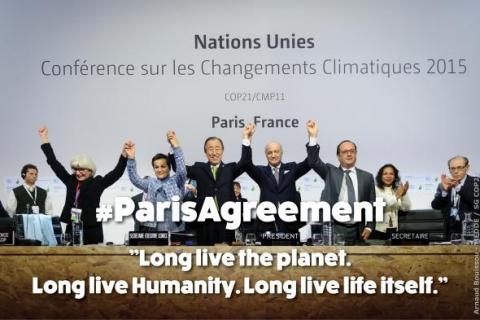Share
What to Expect as U.S. Leaves Paris Climate Accord

The current administration and its appointees including Scott Pruitt to lead (i.e. dismantle) the EPA are doing unspeakable damage to our planet and its future viability. They act with zero regard for the environment and long term health of the globe and its billions of current and future inhabitants ALL for the immediate benefits of corporate interests.
Numerous specific examples of this destruction are noted here, here, here, here, here and here.
As a follow-up to the United States being pulled out of the Paris Climate Accord by Trump, let's review what this means for the U.S., for the 195 nations who signed the agreement, and for the future of our only planet.
What does this mean for the United States?
- The Trump administration plans to invoke the accord’s formal withdrawal mechanism, a winding legal process that will take four years to complete and would lead to an official exit on Nov. 4, 2020, the day after the next presidential election. A future administration could, if it chose, rejoin.
- The Trump administration will keep pushing to dismantle domestic climate policies, including the Clean Power Plan to curtail emissions from power plants, and various regulations on methane leaks from oil and gas operations. Those rollbacks are still far from assured, however, and environmentalists plan to challenge them in court.
- The United States will be doing far less about global warming than it otherwise might have done. In 2015, the Obama administration vowed to cut greenhouse gas emissions 26 to 28 percent below 2005 levels by 2025 as part of the Paris deal.
- The United States could face serious diplomatic repercussions for leaving. Europe, China and other countries may decide to withhold cooperation on issues the Trump administration cares about, like trade. In a more extreme case, other countries could threaten to impose carbon tariffs on the United States.
How might other countries respond?
- Leaders in Europe, China and India have insisted that they will carry on tackling global warming without the United States.
- With the world’s second-largest emitter pulling out, other countries may feel less pressure to step up their own plans to curb greenhouse gases.
- A core part of the Paris deal involved the United States promising $3 billion in aid to poorer countries to help them expand clean energy and adapt to droughts, sea-level rise, and other global warming calamities. The Obama administration already chipped in $1 billion, as have other wealthy nations. But Mr. Trump has vowed to cancel all future payments, and developing nations in Africa and Asia may now prove less eager to tackle their emissions as a result.
- Luke Kemp, a climate policy expert at Australian National University, suggests that the shock of the United States withdrawing could spur other countries to redouble their climate efforts. “In the short term you could see a galvanizing effect,” he said.
- “Other countries are constantly judging each other’s positions in the world,” said David G. Victor, a professor of international relations at the University of California, San Diego. “If it looks like this administration is only going to last for four years, you might see other countries continue to push along on climate and not give up on the U.S. just yet.”
What about climate change?
- The 2015 Paris agreement was meant to be a first step in the long, grinding process of slowing climate change. Countries put forward individual pledges for curbing emissions and agreed to meet regularly...
- Even before the Trump administration’s retreat, those efforts were falling far short. Current pledges, when added up, put the planet on pace to warm 3 degrees Celsius or more above preindustrial levels, an outcome with a far greater risk of destabilizing ice sheets in Greenland and Antarctica, higher levels of sea-level rise, more destructive heat waves and droughts, and the loss of vital ecosystems like coral reefs.
- So far, no country has said it will cut emissions by an additional amount in order to offset weaker action by the United States. “Everyone’s just saying that they will stay the course,” said Oliver Geden, a climate policy expert at the University of Oxford. But that course, he notes, is now even further from the goal of avoiding 2 degrees of warming.
ACTION: Organizations such as the Natural Resources Defense Coucil, 350.org, the Sierra Club will be fighting hard against this administration. Read up on their work at their web sites, follow them on Twitter, and give a donation to them or similar groups. We need environmental groups to be well funded to fight this fight. Their web sites have concrete ways you can get involved beyond giving them money if this fighting for this cause drives you.
Source: https://www.nytimes.com/2017/06/01/climate/us-paris-accord-what-happens-next.html
